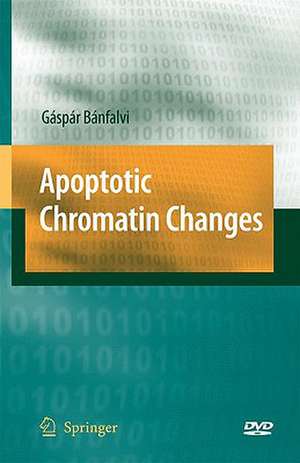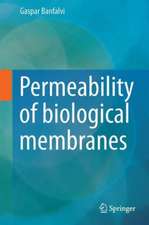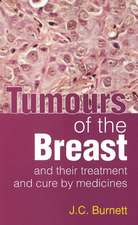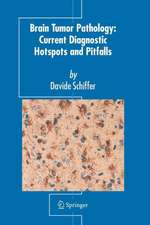Apoptotic Chromatin Changes
Autor Gaspar Banfalvien Limba Engleză Mixed media product – 23 mar 2009
| Toate formatele și edițiile | Preț | Express |
|---|---|---|
| Paperback (1) | 1416.81 lei 43-57 zile | |
| SPRINGER NETHERLANDS – 30 apr 2017 | 1416.81 lei 43-57 zile | |
| Mixed media product (1) | 1427.62 lei 43-57 zile | |
| SPRINGER NETHERLANDS – 23 mar 2009 | 1427.62 lei 43-57 zile |
Preț: 1427.62 lei
Preț vechi: 1502.76 lei
-5% Nou
Puncte Express: 2141
Preț estimativ în valută:
273.20€ • 283.50$ • 228.35£
273.20€ • 283.50$ • 228.35£
Carte tipărită la comandă
Livrare economică 17-31 martie
Preluare comenzi: 021 569.72.76
Specificații
ISBN-13: 9781402095603
ISBN-10: 1402095600
Pagini: 490
Ilustrații: XII, 412 p. With DVD.
Dimensiuni: 155 x 235 x 24 mm
Greutate: 0.86 kg
Ediția:2009
Editura: SPRINGER NETHERLANDS
Colecția Springer
Locul publicării:Dordrecht, Netherlands
ISBN-10: 1402095600
Pagini: 490
Ilustrații: XII, 412 p. With DVD.
Dimensiuni: 155 x 235 x 24 mm
Greutate: 0.86 kg
Ediția:2009
Editura: SPRINGER NETHERLANDS
Colecția Springer
Locul publicării:Dordrecht, Netherlands
Public țintă
ResearchCuprins
DNA Empire.- Structural Organization of DNA.- Chromatin Condensation.- Apoptosis.- Apoptotic Chromatin Changes.
Textul de pe ultima copertă
The Greek word apoptosis was used first by Hippocrates as a synonyme of dislocations of the bones, structural changes related to tissue, by Marcus Aurelius in political and social context as failure and decline. The physician Galen extended the medical meaning of apoptosis to wound healing and inflammation.
Apoptosis, or cell suicide is an integral part of life cycle of plants and animals indicated by the loss of 140-190g (50-70 billion) cells each day in the human adult, amounting to the body weight in one year. The growing interest in apoptosis is indicated by the number of scientific publications since the 1990s which is now more than 140,000 and will exceed 160,000 by the end of 2008.
The unique feature of this book is the use of synhronized and reversibly permeabilized cells allowing to visualize the dynamic nature of chromatin condensation through transitory chromatin and chromosomal forms including changes upon genotoxic treatment, which were not seen earlier. The chromatin condensation process is illustrated from string (DNA) to rope (chromosomes) in more than 160 figures. The interdisciplinary nature of studies summarized in the book facilitate the global view of readers interested in the higher order structure of nucleic acids. The wealth of additional information will attract a wide population of readers. The natural audience engaged in DNA research such as genetics, cell biology, biochemistry, molecular biology will find that it contains essential material.
Apoptosis, or cell suicide is an integral part of life cycle of plants and animals indicated by the loss of 140-190g (50-70 billion) cells each day in the human adult, amounting to the body weight in one year. The growing interest in apoptosis is indicated by the number of scientific publications since the 1990s which is now more than 140,000 and will exceed 160,000 by the end of 2008.
The unique feature of this book is the use of synhronized and reversibly permeabilized cells allowing to visualize the dynamic nature of chromatin condensation through transitory chromatin and chromosomal forms including changes upon genotoxic treatment, which were not seen earlier. The chromatin condensation process is illustrated from string (DNA) to rope (chromosomes) in more than 160 figures. The interdisciplinary nature of studies summarized in the book facilitate the global view of readers interested in the higher order structure of nucleic acids. The wealth of additional information will attract a wide population of readers. The natural audience engaged in DNA research such as genetics, cell biology, biochemistry, molecular biology will find that it contains essential material.
Caracteristici
The first to show the dynamic change of chromatin structures in a cell cycle-dependent manner Describes the intermediates of chromatin condensation Distinguishes between chromatin and chromosomal forms Describes how round shaped chromatin bodies, the first interphase chromosomes are converted to linear chromosomes Proves the linear attachment of chromosomes including interphase and metaphase chromosomes Visualizes chromatin changes upon genotoxic treatment (chemical carcinogenesis, heavy metal, irradiation) Provides the reader with additional information in the glossary section Helps the reader with a detailed list of abbreviations Helps to understand three dimensionality and seemingly difficult terms such as supercoiling Demonstrates that Drosophila chromosomes consist of smaller units called rodlets Demonstrates that the nucleosomal arrangement of Drosophila chromatin consist of meandering loops Reevaluates data of nucleosomal strings and provides a plectonemic chromatin model of chromosome condensation in Drosophila cells



![100 Q&as about Cancer Symp & Cancer Trtmt Side Effct 2e: How to Use Second Life and Other 3D Virtual Environments [With CDROM]](https://i0.books-express.ro/bt/9780763777609/100-q-as-about-cancer-symp-cancer-trtmt-side-effct-2e.jpg)

























